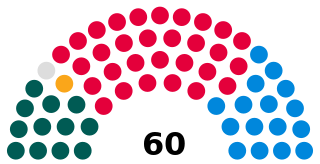
The politics of the United Kingdom functions within a constitutional monarchy where executive power is delegated by legislation and social conventions to a unitary parliamentary democracy. From this a hereditary monarch, currently Charles III, serves as head of state while the Prime Minister of the United Kingdom, Rishi Sunak, serves as the elected head of government.
Mixed-member proportional representation is a mixed electoral system in which votes are cast for both local elections and also for overall party vote tallies, which are used to allocate additional members to produce or deepen overall proportional representation.

The Senedd, officially known as the Welsh Parliament in English and Senedd Cymru in Welsh, is the devolved, unicameral legislature of Wales. A democratically elected body, it makes laws for Wales, agrees certain taxes and scrutinises the Welsh Government. It is a bilingual institution, with both Welsh and English being the official languages of its business. From its creation in May 1999 until May 2020, the Senedd was known as the National Assembly for Wales.

In a first-past-the-post electoral system, formally called single-member plurality voting (SMP) when used in single-member districts or informally choose-one voting in contrast to ranked voting, or score voting, voters cast their vote for a candidate of their choice, and the candidate who receives the most votes wins even if the top candidate gets less than 50%, which can happen when there are more than two popular candidates.

Electoral reform in New Zealand has, in recent years, become a political issue as major changes have been made to both parliamentary and local government electoral systems.
The Independent Commission on the Voting System, popularly known as the Jenkins Commission after its chairman Roy Jenkins, was a commission into possible reform of the United Kingdom electoral system.

The Electoral Reform Society (ERS) is an independent campaigning organisation based in the United Kingdom which promotes electoral reform. It seeks to replace first-past-the-post voting with proportional representation, advocating the single transferable vote. It is the world's oldest operating organisation concerned with political and electoral reform.
The alternative vote plus (AV+), or alternative vote top-up, is a semi-proportional voting system. AV+ was devised by the 1998 Jenkins Commission which first proposed the idea as a system that could be used for elections to the Parliament of the United Kingdom.

The Labour Campaign for Electoral Reform (LCER) is an organisation formed of members and supporters of the British Labour Party, who are interested in issues of democratic renewal and electoral reform.
Instant-runoff voting (IRV) is a voting method used in single-seat elections with more than two candidates. Instead of voting only for a single candidate, voters in IRV elections can rank the candidates in order of preference. Ballots are initially counted for each elector's top choice, losing candidates are eliminated, and ballots for losing candidates are redistributed until one candidate is the top remaining choice of a majority of the voters. When the field is reduced to two, it has become an "instant runoff" that allows a comparison of the top two candidates head-to-head.

The 2011 Scottish Parliament election was held on Thursday, 5 May 2011 to elect 129 members to the Scottish Parliament.
The 2011 New Zealand voting system referendum was a referendum on whether to keep the existing mixed member proportional (MMP) voting system, or to change to another voting system, for electing Members of Parliament to New Zealand's House of Representatives. It was held on 26 November 2011 in conjunction with the 2011 general election.
Electoral reform is a change in electoral systems which alters how public desires are expressed in election results.

There are five types of elections in the United Kingdom: elections to the House of Commons of the United Kingdom, elections to devolved parliaments and assemblies, local elections, mayoral elections, and Police and Crime Commissioner elections. Within each of those categories, there may also be by-elections. Elections are held on Election Day, which is conventionally a Thursday, and under the provisions of the Dissolution and Calling of Parliament Act 2022 the timing of general elections can be held at the discretion of the prime minister during any five-year period. All other types of elections are held after fixed periods, though early elections to the devolved assemblies and parliaments can occur in certain situations. The five electoral systems used are: the single member plurality system (first-past-the-post), the multi-member plurality, the single transferable vote, the additional member system, and the supplementary vote.

The United Kingdom Alternative Vote referendum, also known as the UK-wide referendum on the Parliamentary voting system was held on Thursday 5 May 2011 in the United Kingdom (UK) to choose the method of electing MPs at subsequent general elections. It occurred as a provision of the Conservative–Liberal Democrat coalition agreement drawn up in 2010 and also indirectly in the aftermath of the 2009 expenses scandal. It operated under the provisions of the Parliamentary Voting System and Constituencies Act 2011 and was the first national referendum to be held under provisions laid out in the Political Parties, Elections and Referendums Act 2000.

The Parliamentary Voting System and Constituencies Act 2011(c. 1) is an Act of the Parliament of the United Kingdom that made provision for the holding of a referendum on whether to introduce the Alternative Vote system in all future general elections to the UK Parliament and also made provision on the number and size of parliamentary constituencies. The Bill for the Act was introduced to the House of Commons on 22 July 2010 and passed third reading on 2 November by 321 votes to 264. The House of Lords passed the Bill, with amendments, on 14 February 2011, and after some compromises between the two Houses on amendments, it received Royal Assent on 16 February 2011.

NOtoAV was a political campaign in the United Kingdom whose purpose was to persuade the public to vote against the Alternative Vote (AV) in the referendum on 5 May 2011. The opposition to switching to AV was successful, with the "No" vote to switching to AV receiving 67.9% of votes cast in the 2011 referendum.

YES! To Fairer Votes was a political campaign in the United Kingdom whose purpose was to persuade the public to vote in favour of the Alternative Vote (AV) in the referendum on Thursday, 5 May 2011. YES! To Fairer Votes was unsuccessful in changing the voting system, with 32.1% of votes cast in favour. It was opposed by the anti-reform campaign NOtoAV.

Make Votes Matter is a political pressure group based in the United Kingdom which campaigns for replacing the first-past-the-post voting system with one of proportional representation for elections to the British House of Commons.

The Italian electoral law of 2017, colloquially known by the nickname Rosatellum bis or simply Rosatellum after Ettore Rosato, the Democratic Party (PD) leader in the Chamber of Deputies who first proposed the new law, is a parallel voting system, which acts as a mixed electoral system, with 37% of seats allocated using a first-past-the-post electoral system and 63% using a proportional method, with one round of voting. The Chamber and Senate of the Republic did not differ in the way they allocated the proportional seats, both using the largest remainder method of allocating seats.













